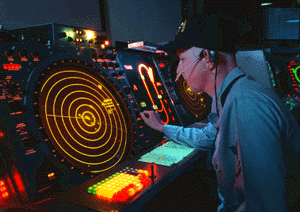Radio communications can avoid jamming with the
use of frequency hopping. So long as the sender and receiver radios are in
sync, they rapidly hop to different frequencies in tandem. This technology
has been used by modern military forces for several years, but has not been
applied to radar. 
The latest air defense radar allows operators to switch among several different frequencies to avoid jamming. However, modern jammers, like those used aboard EA-6Bs aircraft, can jam multiple frequencies. As radar operators select new frequencies, the jammers detect and block, and continue to block previous frequencies to prevent switching back.
Frequency hopping radar would solve this problem by automatically jumping to a different frequency each second. This is easy to synchronize because the sender and receiver exist as the same unit. SInce electronic jammers lack the power to jam all frequencies, they may be rendered obsolete.
Carlton Meyer editorG2mil@Gmail.com
©2001 www.G2mil.com
Letters
Frequency Hopping Radar Exists
Frequency hopping radar has existed for over 30 years! As a former US Navy
Aviation Electronics Tech ("AT"); I was an instructor on the then-new
Lockheed S-3A Viking aircraft in San Diego (1973-'75) The S-3 had a multi-mode
search radar with an "agile" mode, where the syncronizer/transmitter
units were "synched to the receiver, and was advertised as incapable of
being jammed! The system was the Texas Instruments AN/APS-116 (APS=Airborne/Pulsed/Search)
I believe the reason no one else uses "agile"
RF exciters is because "The Evil Empire" didn't possess the
technology. We didn't sell to 3rd world banana republics, and the Soviet
States never developed the technology. The Prowlers only have to perform
defensive jamming against existing threat bands , not the entire defined
RF spectrum!
John Nelson
Ed. I guess the US military doesn't advertise
this technology. I assume it is also used by Aegis radar and Patriot
missile batteries, and maybe AWACS and fighters. On the other hand, the
threat of jamming is often overlooked, and I'm told frequency hopping requires
much more power. The bigger issue is that frequency
hopping is not advanced technology, especially with today's low-cost
computers. If an opponent built an air defense network using frequency
hopping radar, the invincible US Air Force may be blown out of the sky.